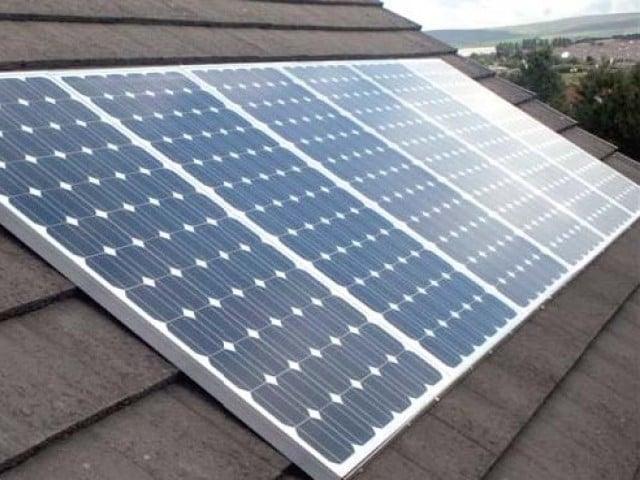Islamabad:
The Finance Committee of the National Assembly, on Tuesday, unanimously rejected the sales tax of 18% proposed on the importation of solar panels, while the Government also announced the withdrawal of another controversial measure to increase sales tax in hybrid vehicles, reversing both anti-environment initiatives.
The committee at its meeting, chaired by the member of the National Assembly of the Popular Party of Pakistan (PPP) (MNA) and former finance minister Syed Naveed Qamar, also raised questions about the new draft proposed law, the Law of Digital Presence 2025 but did not announce his judgment.
The rejection of the 18% sales tax on the importation of solar panels and its parts, as announced by that, is the first rejection of this type by the committee after it began to discuss the Finance Law Project. Unlike the Senate, the decisions of the National Assembly or its Permanent Committee are binding in the case of the Finance Law.
The Government had estimated RS20 billion in income from the 18% sales tax on the import and supply of photovoltaic cells, whether assembled or not. Since the IMF had not supported the proposal, the committee’s rejection will not have adverse implications for the IMF program.
During the committee meeting, the president of the Federal Income Board (FBR), Rashid Langial, argued that the sales tax had already been collected in the Local Assembly of the Solar Panels; Therefore, the rejection of the import stage tax could put the local industry at a disadvantage.
However, he could not give firm figures about the proportion of local industry in total sales, but said that very little percentage was supplied locally. “If the government did not accept our rejection, the National Assembly will veto it,” he said.
Qamar asked the government to find other ways to encourage local industry. The Minister of Finance, Muhammad Aurengzeb, said the era of giving subsidies was over. In that, Qamar reminded him that the government had just announced subsidies in the budget for electric vehicles.
In the budget, the Government had imposed the automobile motor tax from 1% to 3% to raise RS10 billion to finance electric vehicles. “It is a cross subsidy in electric vehicles,” said Aurengzeb. “It is still a subsidy financed by another person,” he replied.
The government has been trying to discourage the use of solar panels, a cheaper electricity source, about the expensive network based on the network. “No political party in the National Assembly has supported the 18% tax and the government will have to withdraw it,” he said. The finance minister recognized the comments.
Hybrid cars
Meanwhile, the Government announced on Tuesday the withdrawal of the proposed increase in the sales tax rate of 12.5% to 18% in hybrid cars of up to 1800 cc. This would result in a loss of potential income of RS7 billion.
The reduced sales tax rate of 12.5% in hybrid cars would maintain, said FBR Langial president. Although, he said to the committee, the Minister of Finance had announced it in the budgetary discourse, the tax would not increase.
It is the second time in the last year when the Government announced to increase the sales rate on sales in hybrid cars, but subsequently withdrew it before the approval of the budget by the National Assembly. According to car policy, the government cannot increase the rate until June 2026.
However, the president of FBR refused to withdraw the proposed increase in the sales tax rate for cars of up to 850 cc of average income Group. In the budget, the Government has proposed to increase the sales rate of sales of 850 cc cars from 12.5% to 18%.
Langial said that if a person can buy a small car of 3 million rupees, he can also pay a 18%sales tax. It seems that after the budget, the small cars will become expensive, but the luxurious SUVs will become cheaper, said Mna Usama Mela of the Pakistan Tehreek-E-Insaf (PTI).
The Committee had a heated discussion about the issue of giving police powers to the FBR and the fear of its abuse by taxes. The entire finance bill is like declaring martial law in business, said PPP Mna Nafisa Shah.
However, President FBR made an exception to label the bill as a work of martial law. “Hard words such as martial law have been used, but I want to clarify that I work for the democratic government,” Langial said, before choosing to leave the meeting room.
The Permanent Committee also showed its discomfort for giving FBR authority to the Local Police to track the unpaid cigarettes and confiscate them. The members observed that this would give the police to extract money from the people. “Poor people smoke to relieve stress, but rich can allow coca -Cola diet,” said Sharmila Faruqi.
The Committee also questioned the new Government’s bill, the Digital Representation Law. The bill has been introduced to collect a 5% tax on the value of online payments made to foreign digital companies such as Netflix and Amazon.
The member of the FBR member, Dr. Najeb Memon, said that the number of foreign payments was much more than RS300 billion and that the government could easily obtain RS15 billion in revenues. He said the credit card payments to companies such as Netflix and Amazon were at RS300 billion this year. The size of tax -free sales by TeMU was also RS4 billion.
The members of the committee asked to present the bill as a separate law instead of making it part of the Finance Law.




